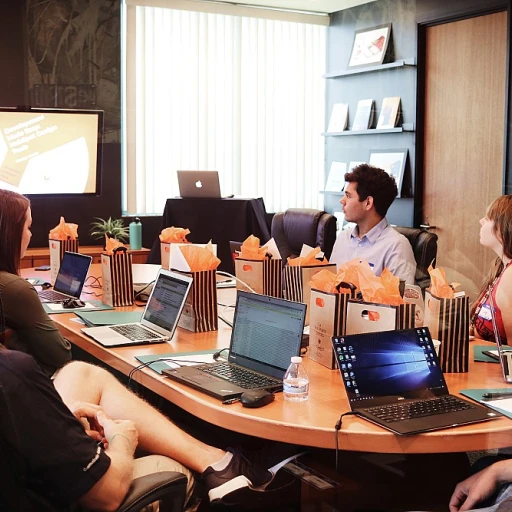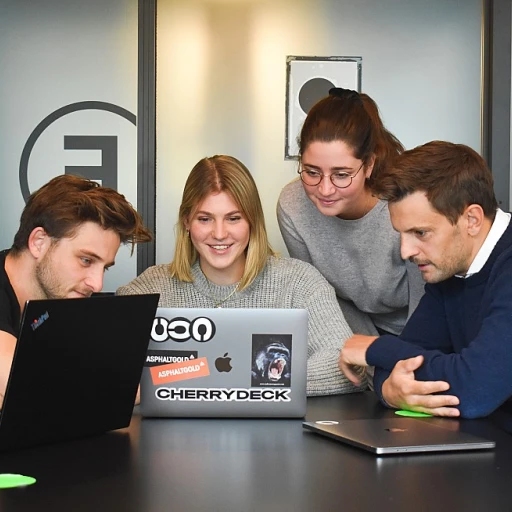
Understanding the Importance of Trainers and Facilitators
Significance of Trainers and Facilitators in Skill Development
In today’s rapidly evolving job market, organizations have recognized the vital role that trainers and facilitators play in orchestrating successful reskilling initiatives. These professionals are essential in constructing a supportive learning environment that caters to diverse learning styles, enabling employees to develop necessary skills for new roles within their organizations. The design and execution of effective training programs require a collaboration of effort among trainers and facilitators, without whom reskilling efforts may falter. Trainers and facilitators each bring distinct yet complementary skills to the table. While trainers often focus on delivering structured training sessions, facilitators create an engagement-focused atmosphere that encourages interactive learning. Their expertise in selecting relevant training content and using proven instructional design principles is crucial. Together, they ensure that each participant gains the ability to apply learned knowledge and skills practically. Given the increasing importance of employee training in organizational development, it becomes imperative for companies to establish a training culture that prioritizes continuous learning and skill enhancement. This approach not only meets immediate corporate learning goals but also empowers employees, fostering a culture of ongoing development. For organizations striving to develop a conducive training culture, considering choosing the right training culture for reskilling is a crucial step. By actively supporting their training facilitators and trainers, companies can effectively manage talent and seamlessly navigate the ever-changing business landscape.Key Skills for Effective Trainers and Facilitators
Essential Competencies for Effective Instruction and Facilitation
In the realm of reskilling, trainers and facilitators are pivotal in imparting knowledge skills and facilitating the growth of learners. To succeed, they need to develop a series of skills that enhance their ability to deliver engaging and impactful training sessions. Here are a few key skills for trainers and facilitators:
- Facilitation Skills: A good facilitator is adept at managing group dynamics and ensuring that each participant is heard and engaged. This requires a deep understanding of learning styles and the ability to adjust training programs accordingly.
- Instructional Design: Effective training facilitators must be skilled in crafting training content that is both informative and engaging. This involves understanding adult learning principles and designing a learning environment that supports the needs of diverse learners.
- Communication Skills: Clarity in communication is crucial, as trainers often need to explain complex subject matter in an accessible way. These skills are essential for keeping participants engaged and ensuring that the information is retained.
- Time Management: Managing time effectively during training sessions is key to covering all necessary material while allowing for interaction and feedback.
By honing these abilities, training facilitators can support participants more effectively and deliver corporate learning programs that drive meaningful behavioral change and skill development across teams.
For a deeper exploration into modern solutions that enhance these skills, consider reading about enhancing workforce capabilities with a modern talent management system.
Challenges Faced by Trainers and Facilitators in Reskilling
Facing the Hurdles in the Reskilling Process
Trainers and facilitators play a crucial role in the complex landscape of reskilling, yet they face numerous challenges that can impede the effective delivery of training programs. These challenges often arise from both structural and human factors and can significantly hinder the progress of reskilling initiatives.
One major challenge lies in accommodating diverse learning styles and preferences among learners. Adult learning theory suggests that individuals learn in different ways, and a training facilitator must be adept at catering to a variety of learning preferences within a single training session. This requires a well-rounded understanding of instructional design and an ability to craft a dynamic learning environment.
Additionally, limited time and resources can put pressure on training programs. Trainers often balance multiple responsibilities, which can stretch their capacity to deliver effective employee training. Beyond time management, securing adequate resources for instructional materials and tools often requires involvement from management and executive teams.
Handling differing levels of skills ability and experience among participants creates another layer of complexity. While some employees may grasp new concepts quickly, others may require extensive support and tailored guidance. This situation challenges the trainer's facilitation skills and necessitates continuous adaptation of training content to meet all attendees at their point of need, ensuring no learner is left behind.
Moreover, there's an ongoing battle against scheduling conflicts and time constraints, particularly within corporate settings where employee training must be integrated into already packed work schedules. Facilitators often need to work closely with organizations to plan programs that respect the workload of employees while maximizing learning potential.
A final hurdle is maintaining the engagement and motivation of participants throughout the duration of a training program. Innovative approaches in development and delivery can help to overcome this – particularly integrating technology into training sessions – but this is not without its own challenges and learning curve.
In conclusion, overcoming these challenges requires skilled training facilitators who are equipped to tailor their approaches to meet the specific needs of their learners. By acknowledging and addressing these obstacles, trainers and facilitators can enhance effective learning outcomes, ultimately resulting in more robust and successful reskilling programs.
Strategies for Successful Reskilling Programs
Crafting a Roadmap for Successful Reskilling Initiatives
Transitioning to new skills through reskilling programs requires more than just effective trainers and facilitators. To achieve success, thoughtful strategies must be implemented. Here's how organizations can enhance their approach to reskilling:- Define Clear Objectives: Begin by setting clear and measurable goals for the reskilling program. This aligns all stakeholders and ensures that the training sessions are focused and purposeful, meeting the organization's needs and learners' expectations.
- Engage Stakeholders: Successful reskilling programs require collaboration across various departments. Engage managers, employees, and subject matter experts to offer insights into the skills required and the learning environment conducive to development.
- Assess Learner Needs: Understanding the unique learning styles and current skills abilities of participants is crucial. Tailoring the training content to accommodate different preferences in adult learning can lead to more effective outcomes.
- Leverage Technology: Digital platforms can enhance the delivery of training programs, providing a flexible and interactive experience. Utilizing the latest tools can also support continuous learning and offer real-time feedback to learners.
- Monitor and Evaluate Progress: Throughout the program, keep track of participants' progress and the effectiveness of the facilitation skills deployed. Regular assessments help in making necessary adjustments and ensure the alignment with the reskilling objectives.
- Provide Continuous Support: Beyond the training sessions, offer ongoing support through mentorship and additional resources to help employees apply their new skills in real work scenarios.
The Impact of Technology on Training and Facilitation
Embracing Technological Advancements in Training
Technology has revolutionized the way training and facilitation are conducted, offering new opportunities for both trainers and learners. With the integration of digital tools, training programs can now be more interactive and engaging, catering to diverse learning styles. This shift not only enhances the learning experience but also allows facilitators to deliver training content more effectively.
Leveraging Online Platforms for Effective Learning
Online platforms have become a cornerstone in modern training sessions, providing a flexible learning environment for participants. These platforms support a variety of instructional designs, enabling facilitators to tailor their approach to meet the specific needs of their audience. By utilizing these tools, training facilitators can manage time more efficiently, ensuring that each training session is productive and impactful.
Integrating AI and Data Analytics
Artificial intelligence and data analytics are playing a key role in the development of personalized learning experiences. By analyzing data from training programs, facilitators can gain insights into the effectiveness of their methods and make data-driven decisions to improve future sessions. This approach not only enhances the skills training process but also supports the continuous development of both employees and trainers.
Virtual Reality: A New Frontier in Training
Virtual reality (VR) is emerging as a powerful tool in corporate learning, offering immersive experiences that can significantly enhance knowledge skills. VR allows participants to engage in realistic simulations, providing hands-on experience that is often difficult to achieve in traditional training environments. This technology is particularly beneficial for skills training that requires practical application, making it a valuable addition to any training program.
Ensuring Accessibility and Inclusivity
As technology continues to evolve, it is crucial for training facilitators to ensure that their programs are accessible to all learners. This includes considering the diverse needs of participants and providing support where necessary. By fostering an inclusive learning environment, facilitators can ensure that every employee has the opportunity to develop their skills and contribute to the organization's success.
Future Trends in Training and Facilitation
Emerging Trends in Training and Facilitation
In the rapidly evolving landscape of reskilling, staying updated with future trends is crucial for trainers and facilitators. The focus is shifting towards more personalized and adaptive learning experiences, which cater to diverse learning styles and maximize engagement among participants. Let's examine some emerging trends shaping the future of training and facilitation.- Emphasis on Digital Learning Environments: As technology continues to transform how we work, training facilitators are increasingly leveraging digital platforms to deliver training content. These environments offer flexibility in time management and provide opportunities for learners to engage with materials at their own pace, enhancing the overall learning experience.
- Integration of AI and Data Analytics: Artificial Intelligence (AI) and data analytics are becoming significant in tailoring training programs. By analyzing engagement patterns and learning outcomes, organizations can make informed decisions to improve program effectiveness and address individual knowledge skills needs.
- Blended Learning Approaches: Combining traditional face-to-face training sessions with online learning is gaining traction. This approach not only supports various learning styles but also facilitates group work and collaboration among teams, enriching the learning process.
- Focus on Soft Skills Development: As automation advances, the importance of skills training in areas like emotional intelligence, communication, and leadership is growing. Effective facilitation skills become essential as trainers guide participants in developing these key competencies.
- Emphasis on Lifelong Learning: With continuous developments in the workplace, the concept of lifelong learning is gaining importance. Trainers and facilitators are increasingly adopting strategies that foster a culture of ongoing learning, allowing employees to keep their skills updated and relevant.













